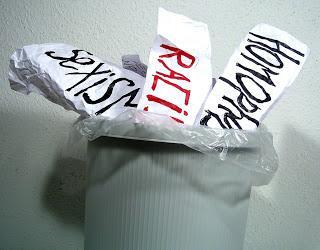
And then there's the I'm-not-a-homophobe-but argument, which is so exactly like the arguments I heard from one fellow white Southerner after another as barriers to human rights for people of color fell away during the 1950s and 1960s as I came of age in the American South:
Here's my response to this argument at a National Catholic Reporter thread yesterday:
Déjà vu: reading this headline transports me back in time to the period of the Civil Rights struggle in the American South in which I grew up. "I'm not a bigot," I heard constantly from many of my family members, friends, church members.
And then the predictable word that ALWAYS followed: "But."
"But I believe people have their places and should stay in them."
"But I believe God made the races different for a reason and God expects them to stay separate."
"But Daddy was a segregationist and I'll remain a segregationist until the day I die."
"But it's against the laws of nature for red birds and black birds to fly together!"
My favorite line from those years: "I have good black friends."
And then: "But."
Surely it's entirely accidental that the hardest and strongest resistance to any kinds of rights for LGBT human beings--including the right to be protected from discrimination in hiring and firing, housing, healthcare, etc.--is situated right in the states of the old Confederacy where my family roots are very deep? In the same part of the country that stoutly resisted rights for people of color and then for women . . . .
And see my further commentary in the same vein (and here) as I responded to critics as the day went on.
The graphic is from the Kurt Löwenstein Educational Center International Team by way of Wikimedia Commons.

